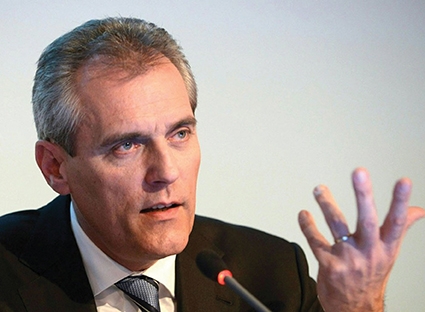OMV Head: Nord Stream-2 Financing Scheme Must Change
Austrian oil and gas giant OMV expects that the scheme for financing the construction of the Nord Stream-2 pipeline will have to be changed due to the new US sanctions. As the head of the oil and gas concern, Rainer Seele stated, “it will probably not be possible to organize project financing for the planned 70% of the cost of the pipeline”.
"We support this project and we are not going to refuse it,” he added. “The obligations to bring the project to an end are certainly preserved, and all enterprises that have given this commitment will try to fulfill them".
OMV Aktiengesellschaft is one of Austria’s largest listed industrial companies. It produces and markets oil and gas, innovative energy and high-end petrochemical solutions. With group sales of EUR 19 bn and a workforce of around 22,500 in 2016, OMV has a strong base in Romania and Austria and a balanced international portfolio.
The new US sanctions, introduced in August, affect the activities of joint ventures in Russia and other countries in the oil and gas industry. In particular, foreign companies are prohibited from participating in such a business if the share of companies from the Russian Federation there exceeds 33%.
At the end of April, Nord Stream 2 AG, a Gazprom subsidiary, and European partners Shell, OMV, Engie, Uniper and Wintershall, signed financing agreements for Nord Stream-2. Under the agreement, the companies pledged to finance a project worth EUR 9.5 billion, totaling 50%, that is, EUR 950 million each. Gazprom is to provide the other half of the funds: EUR 4.75 billion.
At the end of the summer, Shell, OMV, Engie, Uniper and Wintershall allocated EUR 285 million each, and Gazprom's board of directors approved the allocation of another EUR 1.42 billion to Nord Stream 2 AG. The remaining 70% of the value of Nord Stream-2, or EUR 6.65 billion, was supposed to be covered by attracting project financing.
And this is exactly what the American sanctions have called into question. "Project financing at a rate of 70% to us to execute it in its entirety will probably not be possible. The project management will now look for other opportunities,” Seele said. "We will have to look much more towards Asian and Russian banks and think less about banks in Europe and America”.
The head of OMV is in no way ready or willing to give up and does not consider the issue such a serious problem. “Even in the worst-case scenario, in which no bank will give money for the project, the partners will be able to fully cover construction costs out of their own funds,” Seele said.
On behalf of German businesses, he called on the European Commission and the German authorities to take measures in response to US sanctions. "In order to create security, we need constructive steps. We must remember the reliability of energy supplies to the European Union," he said.
The Nord Stream-2 gas pipeline is expected to double the current Nord Stream (from 55 to 110 billion cubic meters per year), next to which it will be laid from the Baltic coast of Russia to Germany. Construction of the Nord Stream-2 is planned to begin late 2018, and put it into operation at the end of 2019.
Dimitri Dolaberidze











